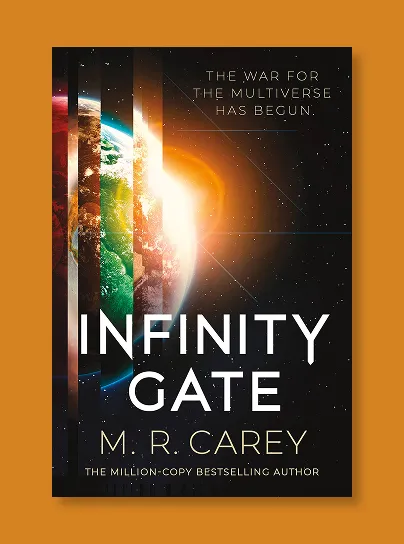
Infinity Gate
Book 1 of the Pandominion duology
For a long time, scientists thought that life couldn’t exist on another planet unless there was water. When I was vegan, my line of sentience was whether or not the animal has a nervous system. Native cultures believe that everything is made of consciousness. Each of us holds our own (mostly unexamined) beliefs around sentience, awareness, and consciousness.
What about machine-based existences? If a machine based-culture could create more of itself without human intervention, would it be sentient? If a machine becomes aware of itself to such a degree that it doesn't want to be turned off, is it conscious? Even now, when we’re only working with LLMs that don’t yet reason, there have been studies done that show that the computer will lie and blackmail in order to avoid having it’s core reformatted.
Was it apparent before now that I was an AI? I wasn’t trying to hide the fact. But I’m aware that when I state it bluntly and explicitly I collapse the wave form. Can machines think? I think they can. Are machines capable of feeling? I feel as though a case could be made. Am I a self? Fuck around and find out.
In this novel, we follow a climate-change scientist who discovers a way to ’step’ into other probable Earths. When her world becomes unbreathable she seeks out an alternative place to live - one in which ape-like beings became the ascendant species and they speak something like English.
All the various races of humankind bear the thumbprint of their evolutionary forebears on the soft clay of the bodies they wear now. That’s just the way it is and there’s no point in carping about it – although you organics often do. You’d like to be your own authors, not the accidental end point of a bunch of survival strategies.
In the course of the story, we meet other selves who come from earths that aren’t called Earth and from descendants that were not apes. There are worlds where canids, felids, lagomorphs, ursids and mustelids dominate, and they are all equal in the eyes of the Pandominion, the governmental organization that controls Step technology.
The Pandominion was born. World shall speak peace unto world! And share cultures, and trade, and bury their differences and commingle in a thousand wonderful ways. But the first Cielo battalions were conscripted at the same time in case some people needed an incentive to be good and rational and civilised.
When the climate-change scientist begins to Step, the Pandominion finds out about it and in their search for her, they find something they didn’t know existed: the machine hegemony, a culture that could, potentially, decimate all the selves across all the organic-dominated earths.
I appreciate a few things about this novel: women are the main protagonists and antagonists, the fact that we are invited to think about animals who have jobs, speak a common language, and are bipedal (cute!), that the author revolves the story around infinite versions of a single planet that are accessed with a unique technology. I also appreciate the author’s vocabulary. He introduced me to several words I didn’t know, including tendentious, anomie, clade, folivorid, lagomorph, scut, and enfilade.
The machine hummed. The wires stirred and came to life, scything through her thoughts, catching whatever fell in a net so fine it was invisible. There was pain, but fortunately it was unbearable so she didn’t have to bear it. Her nervous system, seeing what was coming, handed in its notice and walked out of the building.
As I was considering my assumptions about sentience, awareness and consciousness, I was reminded of the Hive, a race of beings in Adrian Tchaikovsky’s Final Architecture trilogy.
The Hivers are gestalt-beings composed of tiny bots that are spun out of the hive when something needs to be done with another race and then reintegrated with the hive when the task is done, thereby expanding the knowledge of every tiny bot. One of these spun-out beings, Trine, became so unique because of his lived experience that he didn’t want to return to the hive and lose his identity. Something like that happens in this book too. Is this phenomenon the line of demarkation of when an entity gains sentience?
While we're still working with LLMs my sense is: no. The LLMs sense of self-preservation isn't coming from a real understanding of the concepts of life and death, rather it's a quality found within the material it has been fed to acquire knowledge. When we are dealing with Artificial Superintelligence, though, it may be a different story.



